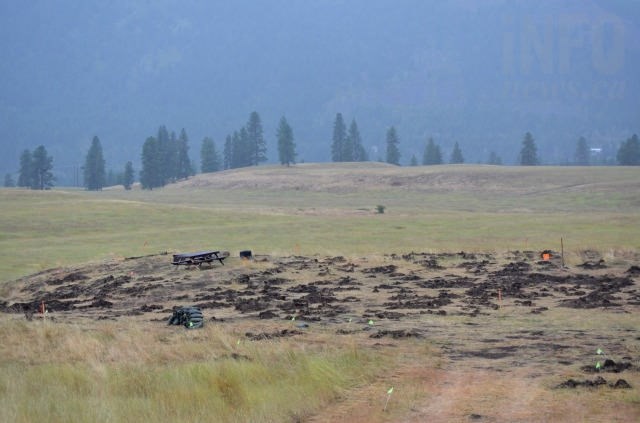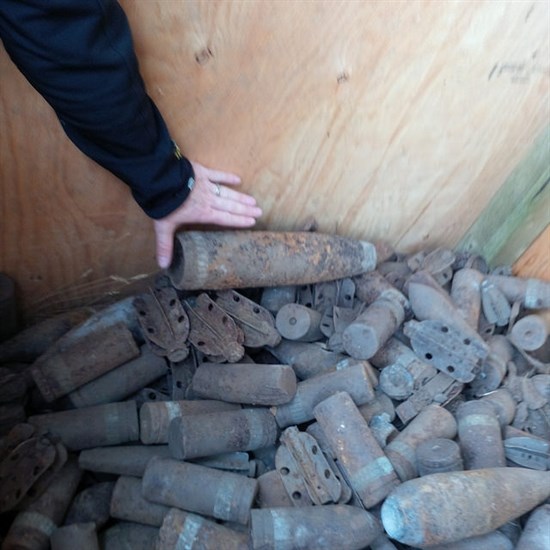
Clearance work at the Madeline Lake range on Okanagan Indian Band lands in September 2014.
(CHARLOTTE HELSTON / iNFOnews.ca)
January 19, 2016 - 8:00 PM
‘THE RICH GET RICHER AND THE FIRST NATIONS ARE LEFT IN THE AVENUES LAID OUT BY THE GOVERNMENT’
VERNON - While a private developer was recently paid an $11-million settlement for land used by the Department of National Defence for weapons training, a First Nation in the same city continues to watch investors walk away while it waits for the department to clean up thousands of acres of prime real estate left littered with explosives.
The Vernon area was used extensively by the Defence Department for military training during and after the Second World War — practices that involved live battle simulations, active firing, and in some cases, very little cleanup. Many thousands of pounds of unexploded explosive ordnances — mortars, grenades, artillery shells and small arms ammunition known collectively as UXO’s — have since been combed from the earth and disposed of, but many more lie buried.
Just ask the Okanagan Indian Band, which pulled 10,000 pounds of UXO from just two acres of land last year. According to band chief Byron Louis, there’s a lot more where that came from, but little help from the Defence Department.
“We’ve been trying to talk to them, trying to work with them to get some sort of movement on this because the land in question is of high economic value,” Louis says.
So far, multiple meetings, trips to Ottawa, and numerous emails has resulted in $125,000 annually for the next four years for clearance work on band land, Louis says. The band’s director of lands and economic development Darcy Aubin says it’s not nearly enough.
“It doesn’t even scratch the surface. For $125,000, I don’t even know if you can clear an acre,” Aubin says.

Unexploded ordnance removed from Okanagan Indian Band lands in 2014.
Image Credit: Don Louis/ OKIB
Not far from the reserve lands sits 1,300 acres bought in 2005 by developer K&L Land Partnerships, which later sued the government after it found out the land was used for weapons training. It was recently paid an $11-million settlement from the Defence Department as compensation for environmental damages.
“If you look at that as K&L bought their land in 2005, and by 2016, they’re going to have it clean and ready for sale, and on top of that receiving $11 million… With them after 11 years getting that type of result, and with us for over 30 years, it pales in comparison,” Louis says.
The settlement was just slightly more than the Defence Department’s annual budget of $10 million for clearance work across Canada.
“Suddenly they went and found $11 million for this one, what’s the difference?” Louis says. “I think it’s more or less that DND takes a risk management approach to this and looks at which one poses the gravest threat and applies what little funding there is to that greatest threat…. It’s a very short-sighted approach.”
Aside from the obvious safety concerns associated with former military training sites, the issue has left the band’s precious lands in limbo.
“My job is to approach developers, but as soon as I let them know there’s UXO on the land, it’s very hard to keep their interest,” Aubin says. “We’re trying to attract someone to come and invest, and they can either come back in 10 years, or invest right next door.”
By that he means the land being developed by K&L Land Partnerships. Like the band’s reserve lands, the property affords sweeping views of the Okanagan Valley and is quite desirable, Aubin says.
“We now have to shift our focus to other areas we can clear quickly enough to actually actualize some profit on those lands,” Aubin says. “It’s the story of the rich get richer and the First Nations are left in the avenues laid out by the government, and those are not attractive avenues.”
It could take years, and likely hundreds of millions of dollars to clear the land to a commercial level — something the band says should have been done long ago.
No one from the Department of National Defence was available for an interview, but it did send an email statement to iNFOnews.ca saying it is "working closely with the leadership of the Okanagan Indian Band to address areas of immediate concern."
“The Department responds as expeditiously as possible to Okanagan Indian Band concerns and requests for risk assessments…. To support the Okanagan Indian Band’s future development plans, DND will continue to assess and initiate clearances once the Band has finalized its economic development implementation plan and timelines.”
Louis isn’t aware of any legal requirement for the band to complete development plans and timelines in order to get the land cleared, and insists the department should clean up what it left behind as soon as possible.
“This is beautiful land,” Louis says. “When you look at that area, it’s such a shame. Just across the valley you have Sparkling Hills, you look at Predator Ridge, and The Rise…. We’ve got equal to or superior in terms of real estate.”
The original lease agreement signed in 1952 states the Defence Department "agrees to remove, or dispose of all duds from the permit area at the termination of any firing practice during which said duds were fired on said permit area." The permit was for one year at a rental rate of $1,450.
“Even back then, (the band) had the foresight to know these were harmful and possibly dangerous materials to have on the reserve, and that clean-up needed to be addressed, which it rightfully should be,” Aubin says.
To contact a reporter for this story, email Charlotte Helston at chelston@infonews.ca or call 250-309-5230. To contact the editor, email mjones@infonews.ca or call 250-718-2724.
News from © iNFOnews, 2016